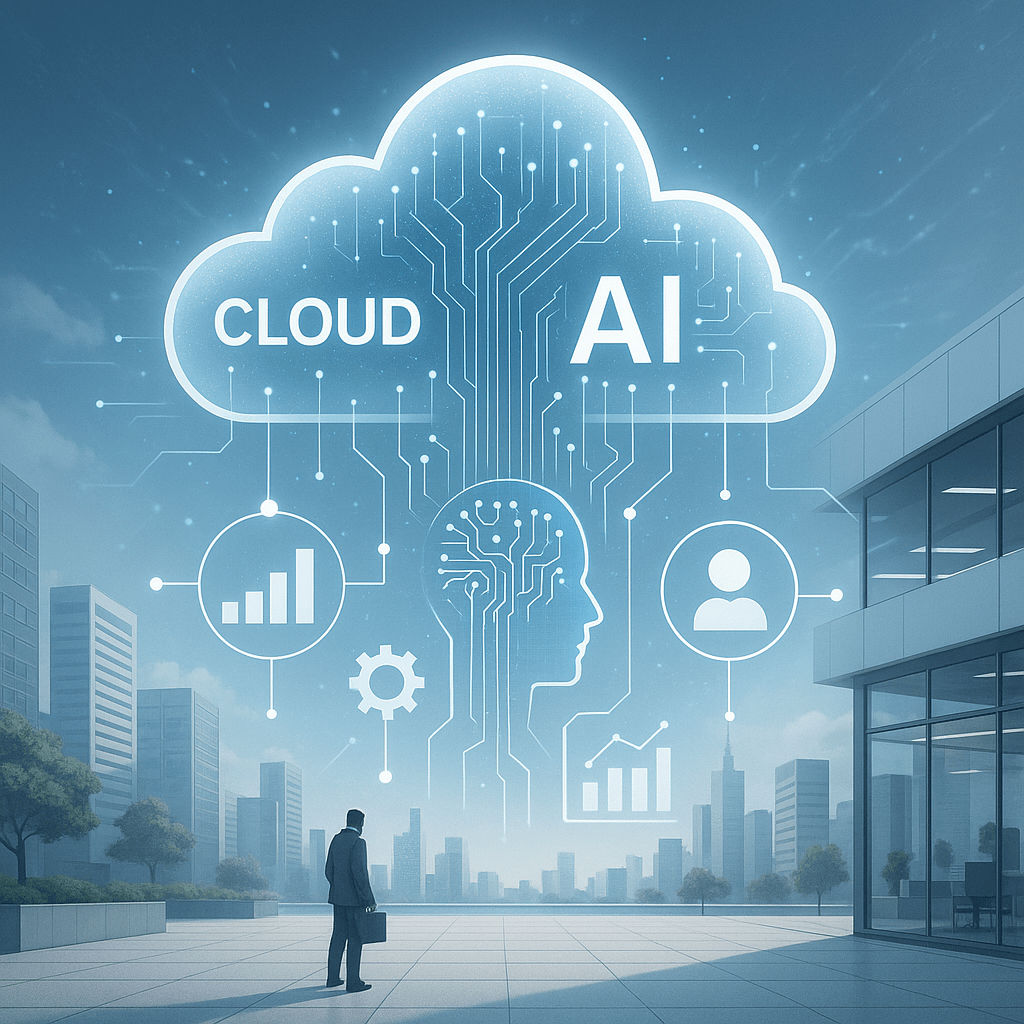Did you know the world market for AI cloud services is projected to reach $120 billion by 2025? This massive expansion indicates how AI in cloud technology is revolutionizing business. It streamlines operations and enhances customer engagement, resulting in improved business growth.
Looking into AI in cloud technology, we notice that it’s revolutionizing things for companies. It simplifies processes and facilitates better decisions. AI cloud services have immense scope for companies that want to win big.
Key Takeaways
- AI cloud services are taking off quickly, expected to hit $120 billion by 2025.
- This revolutionary technology increases operational effectiveness and customer interaction.
- Leveling AI in cloud technology is revolutionizing the way companies do things.
- AI cloud services automate and enhance decision-making processes.
- Companies can utilize AI innovation for immense growth potential.
The Progress of AI and Cloud Technology
In recent times, AI and cloud computing have advanced remarkably. These developments are most essential in identifying how they can transform companies. Machine learning, neural networks, and data analytics form part of AI development. These are the most important in the current state of AI.
Learning the Fundamentals of AI
AI has numerous branches and approaches, all contributing to its growth. Major components are:
- Machine Learning: A Method for algorithms to improve over time.
- Natural Language Processing: Enables computers to comprehend human language.
- Neural Networks: Replicate the brain to study intricate data.
Understanding these AI fundamentals is crucial for learning about its place in cloud computing.
The Rise of Cloud Computing
Cloud computing has changed how businesses use technology. Its growth has been marked by several important moments:
- Inception of Virtualization: Allows many operating systems to run on one machine.
- Launch of Amazon Web Services (AWS): Started the cloud service model.
- Widespread SaaS Adoption: Made it easy to access software online.
These milestones highlight the collaboration between cloud and AI. This alliance is powering new concepts and making things more efficient in various sectors.
Key Benefits of AI in the Cloud
The application of AI in the cloud has a lot of advantages that can enhance business performance. Businesses can enhance efficiency and productivity. They also get to utilize resources better.
Cost Efficiency
One major advantage of AI in the cloud is cost savings. It reduces server costs and maintenance. With a pay-as-you-go pricing model, businesses pay only for what they consume.
This adaptive pricing aids in planning the budget. It allows companies to better manage their funds.
Scalability and Flexibility
Cloud solutions are highly scalable and versatile. Businesses can scale their services quickly without significant initial expenses. This facilitates quick responses to market shifts.
We can dynamically vary our AI resources when needed. This provides peak performance at all times.
Real-Time Data Processing
AI in the cloud enables real-time analytics. Companies can make quick decisions with real-time insights. This quickness provides us with a competitive advantage.
AI in Cloud Technology: A Game Changer for Businesses
We’re seeing big changes in how businesses make decisions, thanks to AI cloud technology. This tech lets us dig deeper into market trends and what customers want. It helps us use business intelligence better, leading to smarter choices.
Enhancing Decision-Making Processes
AI in cloud computing is revolutionizing things for us. It employs intelligent algorithms to forecast results with greater precision. These are some of the ways AI cloud technology is assisting us in making improved choices:
- Data-Driven Insights: We can identify patterns and trends in large data, directing our strategies.
- Predictive Analytics: We can anticipate what is ahead, allowing us to steer clear of risks and seize opportunities before others.
- Real-Time Data: We obtain current data, enabling us to promptly change our plans by the real-time market information.
With these communication AI tools, our efficiency increases, and we can develop our business in the long term.

Discovering AI Cloud Services
Businesses are using more technology, so it’s key to know about AI cloud services. This overview breaks down these services into categories. It shows common models and what they offer. Understanding these types helps us choose better.
Different Types of AI Cloud Services
There are several main AI cloud service models:
- AI-as-a-Service (AIaaS): This model gives us on-demand AI access without needing deep knowledge.
- Machine Learning Platforms: These include tools and algorithms with which models are trained. They assist us in obtaining insights from data.
- Natural Language Processing Services: This service allows machines to read and comprehend human language. It improves interaction with users.
Selecting the Right Service Provider
The selection of the right service provider is fundamental to achieving our business requirements. We need to consider:
- Reliability: Ensure the provider’s uptime and record so that services are readily available.
- Support: Look for good customer service and technical support. They should help when problems come up.
- Technology Stack: Examine the provider’s technology. It affects how well their solutions work with our systems.
How to Implement AI in Your Business
Beginning with AI in your business requires a cautious plan. We first perform an in-depth business check to understand what we require and encounter. This aids us in discovering where AI can make things more efficient and innovative.
Following that, we strategize to implement AI. This planning is crucial for a successful AI start.
Assessing Your Business Needs
Understanding what we currently do is crucial to identifying where AI can assist. This action is all about:
- Examining our current methods to identify what is not doing well.
- Discussing with people to understand what is bothering them.
- Observing how AI can assist us.
Developing an AI Strategy
After reviewing our business, we establish a comprehensive AI plan. This plan includes:
- Specific objectives for what we want AI to perform.
- How much funding and manpower do we require?
- How we’ll measure if we’re doing it right.
Case Study: Successful Companies Using AI in the Cloud
Most AI success stories illustrate how AI transforms companies in the cloud. Netflix and Google are examples of large-scale transformations. They use cloud AI services to expand and enhance their operations.
Innovative Strategies from Industry Leaders
AI and cloud technology are being used in innovative ways by industry pioneers. Netflix applies machine learning to recommend films based on what you have watched. This makes customers more satisfied and leads them back for more.
Google employs AI to enable data to work quickly and improve. Their software enables organizations to make decisions quickly. These organizations demonstrate the ability of AI to make organizations better.
Outcomes and Impact on Business Growth
These tactics have significant impacts on finances and market share. Netflix’s human touch has gained more subscribers. Google Cloud’s artificial intelligence keeps companies ahead.
Being in the cloud with AI achieves actual outcomes. It transforms issues into opportunities for growth. From these narratives, we can see how important AI is now.
The Future of AI in Cloud Technology
Looking forward, we observe thrilling changes in AI and cloud technology. These future trends in AI give us a glimpse of how companies may transform. Automation, natural language processing, and edge computing will define our work.
Upcoming Trends to Look Out For
Over the next few years, various trends will define cloud technology growth. They are:
- Automation: Creating processes that are efficient and productive in most sectors.
- Natural Language Processing: Simplifying the way humans and machines communicate.
- Edge Computing: Bringing compute closer to data sources for faster, superior user experiences.
Long-Term Business Impacts
Businesses will be impacted significantly by these trends. Businesses will have to adapt to new technology and new consumer demands. Some of the most critical impacts are:
- The necessity to keep pace with new technologies and innovations.
- Increased emphasis on data-driven decision-making, leveraging AI for insights.
- Increased work from home, courtesy of sophisticated cloud solutions.
Managing Challenges and Risks
Including AI in cloud offerings points to the importance of sound AI risk management. Organizations have significant challenges, particularly in data security and privacy. It’s essential to have robust security measures to guard sensitive data.
Data Security and Privacy Issues
Privacy of data is a huge concern for companies operating in AI. We must implement robust security measures to protect personal and business data. Proper handling of data is:
- Encryption of sensitive information both in transit and at rest.
- Periodic security audits to identify and repair vulnerabilities.
- Employee training for data protection.
By implementing these measures, we can improve data breach protection and secure our customers’ information.
Regulatory Compliance Issues
There are compliance issues that arise when we utilize AI. Understanding laws such as GDPR and CCPA is critical to businesses. Adhering to the rules saves risks and earns customers’ trust. Key measures are:
- Carrying out periodic compliance audits.
- Creating transparent data use policies.
- Showing that we comply by documenting the handling of data.
By being proactive on compliance, we satisfy regulatory requirements and enhance our AI plans.

The Role of AI in Enhancing Customer Experience
In the current business era, AI is transforming the way we engage customers. It assists us to know and serve them differently. The technology is making our customer service second to none.
Personalization Through AI
Good customer service depends on personalization. AI assists us in employing customer information to personalize our services. This allows us to provide personalized marketing and product recommendations that suit their requirements.
This is not only better for satisfaction but also forms long-term relationships. It’s a win-win situation for the business and the customer.
Predictive Analytics for Customer Insights
Predictive analytics is important in helping us understand what customers need. It sifts through massive amounts of data to identify trends. This assists us in making decisions that satisfy customer needs.
By doing so, we can provide services that customers love. It makes them loyal and happy. This gives us the lead in the market.
The Role of Data in AI Cloud Services
In the ever-evolving world of AI cloud services, data is essential. We must handle data properly and make sure it is of high quality. This is important for long-term success and innovative ideas in AI.
Data Quality and Management
Having good data is crucial for AI to function properly. Bad data is where wrong conclusions are made and poor decisions are taken. We need to maintain our data clean, verify it regularly, and increment it.
This keeps our databases robust. A robust database ensures our AI tools perform optimally.
Utilizing Big Data for AI Algos
Big data analytics is a big chance to improve AI. It lets us use lots of data to train AI models better. This way, AI can predict more accurately.
Using big data in AI helps us find patterns we didn’t see before. This leads to smarter business plans. By using big data well, we can keep making our AI better and more innovative.
Combining AI with Other Technologies
Investigating AI with other new technologies demonstrates significant advantages for our business solutions. One of the most significant areas is the combination of IoT and AI. The combination allows firms to leverage a lot of data from IoT devices. It assists in making more informed decisions and intelligent operations.
Investigating IoT with AI Cloud Services
IoT and AI cloud services combined have revolutionized countless industries. They provide real-time analytics and automation. AI assists in analyzing data from the linked devices, making firms efficient and effective.
In manufacturing, for instance, IoT sensors monitor equipment condition. AI anticipates when maintenance should be performed. This reduces downtime and reduces expenses.
Advantages of AI and Machine Learning Combined
AI and machine learning together bring even more change. Machine learning makes AI systems smarter by learning from data. This leads to systems that adapt and offer personalized solutions.
The benefits include better forecasting, deeper customer insights, and improved risk management. These advantages help businesses grow and succeed.
Conclusion
As we wrap up, incorporating AI in cloud services has great opportunities for business transformation. We’ve observed how it assists in making improved decisions, enhancing customer support, and utilizing data in real-time. This synopsis indicates the large impact it can bring to businesses.
We encourage all companies to consider incorporating AI into their agenda. Harnessing AI in the cloud can make businesses more effective and competitive. Through these technologies, we can position ourselves for success and make our businesses thrive.
In our final reflections, AI in the cloud is a growth deal and new ideas. As we continue to learn about such technologies, we should be cautious about risks but also seize the gains. This way, we’ll be prepared for the business future in a world more interconnected than ever.

FAQ
What is AI in cloud technology?
AI in cloud technology refers to employing artificial intelligence with cloud computing. It enables companies to employ sophisticated algorithms to analyze data and automate processes. This enables them to take informed decisions without forking out a lot of money for hardware.
How does AI enhance efficiency in companies?
AI enhances efficiency in companies through the automation of mundane tasks. This allows employees to work on critical projects. AI also rapidly analyzes large data, providing insights for quicker, wiser decisions.
What are the cost advantages of AI cloud services?
It is cheaper to use AI cloud services because you only pay for what you consume. This saves you from the expense of possessing and maintaining hardware. It also allows companies to expand their resources whenever needed.
What is the purpose of data in AI performance?
Good data is essential for AI to function effectively. It assists AI in making proper predictions and insights. Therefore, proper data management is important to ensure AI success.
How do we manage data security if we’re using AI in the cloud?
In order to secure data, implement encryption and security scans regularly. Moreover, comply with regulations such as GDPR and CCPA. A robust security strategy defends against cyber attacks and data loss.
What are various AI cloud services?
There are numerous AI cloud services, such as AIaaS, machine learning, natural language processing, and computer vision. These services provide tailored solutions for various business requirements.
How do we select the appropriate AI cloud service provider?
Consider the provider’s reliability, customer support, technology, and standards compliance. Doing your research leads to identifying a partner that aligns with your business objectives.
What can we expect from future trends in AI and cloud computing?
Look for significant changes in automation, natural language processing, and edge computing. Staying ahead of these trends is key to dominating the marketplace.











Leave a Reply